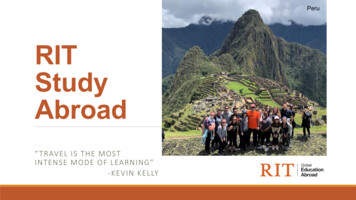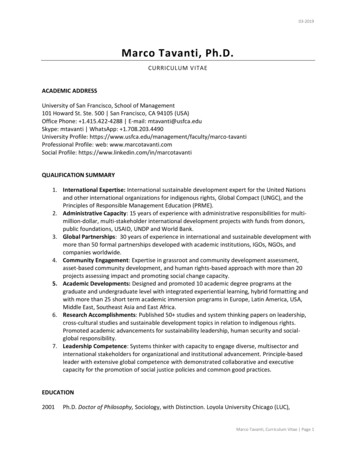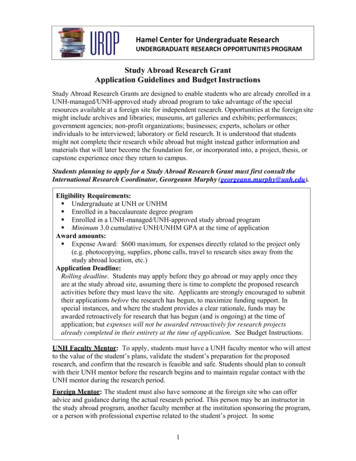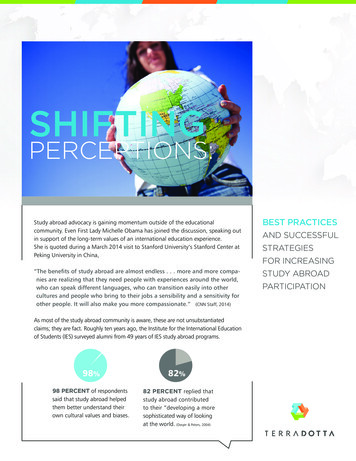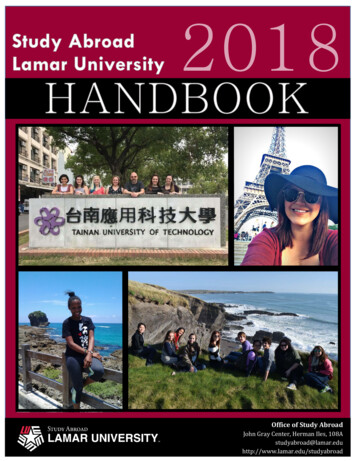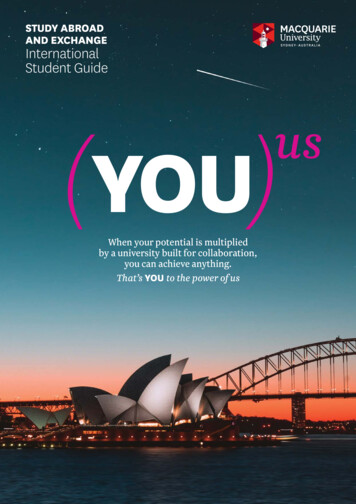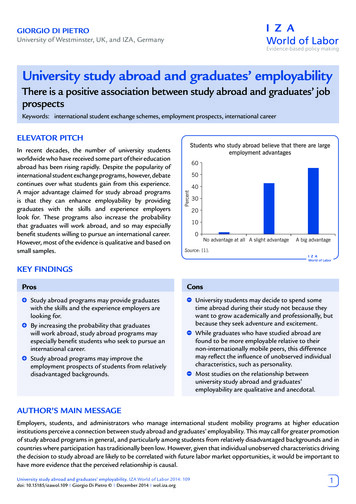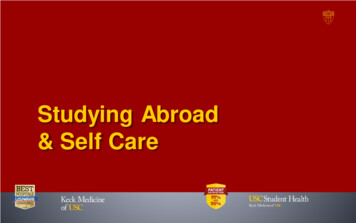
Transcription
Studying Abroad& Self Care
How About SomeDeepBreaths?
Let’s Talk About . . . Stress Managing Distress Managing EmotionsSocial SupportProblem Solving Mental Health Resources Workshop Post-SurveyGuidelines Create a safe space for honestsharing, reflection, & questions Be respectful of others and mindful ofthe language we use
Even good things can be stressful!
Understanding Culture Shock
Resilience & ThrivingAm I Thriving?Accepting, Coping, LearningAm I Resilient?Recovering, FlexibleAm I Surviving?Overwhelmed, Irritable, Crisis
Consider 3 SolutionCategories:1. Managing Emotions2. Social Support3. Problem Solving
Managing Emotions Managing emotions requires observing your thoughts (non-judgement) and accepting them. Avoidance of feelings will keep them growing with a side ofanxiety or guilt.
ManagingEmotionsUsing language to name thefeeling can calm the emotionalbrain down.
Managing EmotionsMake a plan for what you need to be in place. Plan for therapist (using iSOS). Even if you don’t need it, you will already have the info rather than whenyou feel in crisis or don’t have the energy to look it up Have your medications for you, do not plan to stop them while you are away. Always consult with yourprovider.
Managing Emotions Remind yourself WHY you chose to study abroad, write it down. Create a list/vision board before leaving of all the things you are looking forward to during your studyabroad. When feeling down, review your list to remind yourself of your earlier excitement and goals.
Social SupportBiggest predictor for thriving is: Feel connected Sense of belonging Part of communityResearch links high social media use to low self esteem,depression, anxiety.
Social Support Stay in touch with the key people in your life. Be mindful howeverthat if you are spending a significant or too much of timecommunicating with folks back home, you may be avoiding yourown successful adjustment to the new culture. Be with others. What has typically helped with social anxiety?
Social Support Plan meals with others, structure study time or other time withothers. If you are nervous about confiding in others, write out what youwould like to say. OR ask them how they handled a similarproblem Be prepared to possibly trying more than once, as youdetermine your friends different strengths.
Problem SolvingWhat is the problem, and what would bepossible solutions?’(ex - starting a homework project, sending anemail to a professor)
Problem SolvingHomesicknessFocus your energies on documenting your journey:journal, take pictures, use social media, etc. Writedaily as much as you wish, but at least one pageeveryday. If you can, do it in the language of thecountry you are visiting.
Problem SolvingHomesicknessFind local and free activities.Focus your energies on documenting your journey: journal, takepictures, use social media, etc. Write daily as much as you wish, butat least one page everyday. If you can, do it in the language of thecountry you are visiting.
Flip that Notecard OverThings that Help me Reduce my Stress:
Mental Health & Study AbroadThe excitement of studying abroad will not distract you or cureclinical depression, an eating disorder, generalized anxiety,panic attacks, or other mental health difficulties.The goal of studying abroad is to explore a culture, not escapefrom the life you have.
Takecare ofYOU!
Don’t Forget the Basics Eat healthily Stabilize, decrease oreliminate caffeine use Sleep on a regular schedule Exercise frequently
The Final ChapterThings that Help me Reduce my Stress:RESOURCES:My Strengths & Positive Coping Skills:People who could help:Campus & Other Resources:
iSOS Resources while Abroad AETNA SOS studying abroad international benefits resources APP to download https://www.internationalsos.com/
Campus Resources DPS: Dept. of Public Safety (213) 740-4321 CSI: Crisis Support & Intervention Mindful USC appFor people struggling, please call the National Suicide Prevention Lifelineat 1-800-273-TALK (5233) and the Crisis Text Line (Text “START” to 741741)
Trojans Care 4 TrojansA private & anonymous online report for non-emergencystudent concerns Through the Office of Campus Wellness andCrisis Intervention Connects them to individuals who arecommitted to student safety Access ojans/
Counseling & Mental HealthTelehealth and ZoomOne-on-one TherapyGroup therapyPsychiatryNeed anappointment?Call us! Our 24/7 line is:(213) 740-9355(WELL)Visit MySHR!usc.edu/MySHRWorkshop via Zoom –sign up on MySHRFor group and workshop listings, visitstudenthealth.usc.edu
COVID-19 FAQsHow do I make an appointment?Call 213-740-9355 or go to MySHRWhat are my options re: meeting a therapist?Any Questions?Call the COVID-19 hotline, including questions for theEmergency Operations Center (EOC) team: 213-740-6291 For students, faculty and staff encounteringdifficulties returning to the United States from abroaddue to travel restrictions For the USC community, including parents of currentstudents, to ask any questions related to COVID-19Phone or Zoom meetingHow is my confidentiality protected?Zoom is HIPPA compliant and confidential.For the latest USC COVID-19 updates, visit:https://sites.usc.edu/coronavirus/
Don’t forget, it is always okay to seek help.
Please Scan to Fill Out our SurveyWe want toknow whatyou think!
Mental Health & Study Abroad The excitement of studying abroad will not distract you or cure clinical depression, an eating disorder, generalized anxiety, . Mindful USC app For people struggling, please call the National Suicide Prevention Lifeline at 1-800-273-TALK (5233) .



